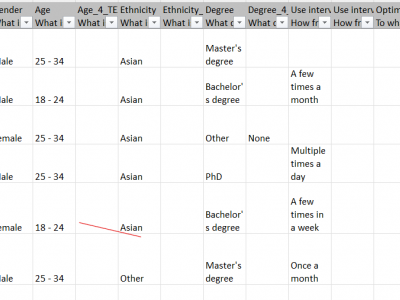Education

This study investigates whether the ingredients listed on restaurant menus can provide insights into a city's socioeconomic status. Using data from an online food delivery system, the study compares menu items with local education rates and rental prices. A machine learning model is developed to predict menu prices based on ingredients and socioeconomic factors. An efficiency metric is proposed to cluster restaurants to address autocorrelation, comparing ingredient averages to socioeconomic indicators.
- Categories:
 313 Views
313 Views
Contributions: This study offers valuable insights to MOOC designers about user priorities associated with web accessibility principles for designing web content that provides higher levels of user experience, motivating course completions. Background: MOOCs improve access to quality education. Despite policy support and more involvement by leading educational institutions worldwide, poor course completion rates undermine the objectives for MOOC diffusion.
- Categories:
 3 Views
3 Views
Contributions: This study offers valuable insights to MOOC designers about user priorities associated with web accessibility principles for designing web content that provides higher levels of user experience, motivating course completions. Background: MOOCs improve access to quality education. Despite policy support and more involvement by leading educational institutions worldwide, poor course completion rates undermine the objectives for MOOC diffusion.
- Categories:
 6 Views
6 Views
LinguoInsight English Textbook Corpus
- Categories:
 161 Views
161 Views
In the domain of Natural Language Processing (NLP), the English Writing Fluency Improvement for non-native speakers, particularly in academic contexts, poses significant challenges. While Sentence-level Revision (SentRev) endeavors to address this concern, the existing evaluation corpus, SMITH, falls short in offering a robust and comprehensive assessment of the task. To bridge this gap, our research offers a novel evaluation corpus generation scheme, leading to the creation of Ten-Country Non-native Academic English Corpus (TCNAEC).
- Categories:
 59 Views
59 ViewsThis survey dataset delves into the diverse experiences and perspectives of individuals, focusing on key aspects of their educational journey and subsequent career choices. Comprising more than 60 questions or attributes,respondents were asked to share insights into their personal background, educational history, university preferences, and current professional status. The questionnaire covers a range of topics, including high school experiences, university decision-making criteria, major selection influences, and post-graduation outcomes.
- Categories:
 1186 Views
1186 ViewsThe Numerical Latin Letters (DNLL) dataset consists of Latin numeric letters organized into 26 distinct letter classes, corresponding to the Latin alphabet. Each class within this dataset encompasses multiple letter forms, resulting in a diverse and extensive collection. These letters vary in color, size, writing style, thickness, background, orientation, luminosity, and other attributes, making the dataset highly comprehensive and rich.
- Categories:
 517 Views
517 Views
Gamification is a rapidly evolving field that seeks to integrate game mechanics and elements into non-game contexts to enhance the learning experience of computer science students.
- Categories:
 844 Views
844 ViewsRITA (Resource for Italian Tests Assessment), is a new NLP dataset of academic exam texts written in Italian by second-language learners for obtaining the CEFR certification of proficiency level.
RITA dataset is available for automatic processing in CSV and XML format, under an agreement of citation.
- Categories:
 418 Views
418 Views


